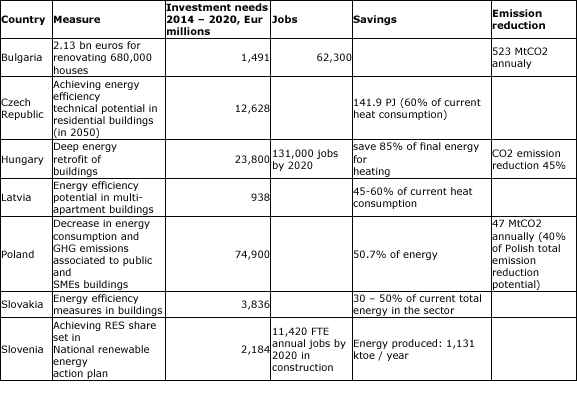No Half Measures: Investment Needs in Energy Efficiency and Renewables in Central and Eastern Europe
Brussels — At least 172 billion euros need to be invested in energy efficiency and renewables in central and eastern Europe over the next seven years to kick start the decarbonisation of the region and create hundreds of thousands of much needed jobs, shows a study published today by CEE Bankwatch Network [1]. The next EU budget (2014-2020) could contribute to these needs if current short-sighted attempts by some member states to cut the overall size of the budget are prevented.
13 September 2012

Brussels — At least 172 billion euros need to be invested in energy efficiency and renewables in central and eastern Europe over the next seven years to kick start the decarbonisation of the region and create hundreds of thousands of much needed jobs, shows a study published today by CEE Bankwatch Network [1]. The next EU budget (2014-2020) could contribute to these needs if current short-sighted attempts by some member states to cut the overall size of the budget are prevented.
The Bankwatch study compiles investment needs for the energy efficiency and renewables sectors from seven CEE countries, namely the Czech Republic, Poland, Hungary, Slovakia, Slovenia, Bulgaria and Latvia. Summed up, investment needs in these seven countries amount to 24.626 billion euros yearly, adding up to 172.382 billion over seven years.
Last fall, the European Commission proposed that approximately 30.83 billion euros would be available for all 27 EU member states for low carbon measures from the next European budget, primarily from regional funds (the European Regional Development Fund and the Cohesion Fund).
“Compared to the calculated investment needs for just 7 CEE countries, it is clear that the amount suggested to be set aside by the European executive is not enough and can only give a small push in the right direction,” comments Ondrej Pasek, Bankwatch energy campaigner and coordinator of the study. “If member states decide to cut the entire next EU budget, any chance for a real positive change would be compromised.”
Governmental and scientific studies of existing projects and future projections reviewed by Bankwatch in the study show that investments in energy efficiency and renewables come not only with important climate benefits but also with positive economic and job creation effects that cannot be ignored in times of economic crisis.
For example, the Bulgarian National Renovation Programme calculates that renovating 680 000 households by 2020 could lead to avoiding emissions of half a million CO2 tonnes, while at the same time creating over 60 000 jobs. To achieve these results, around 2.1 billion euros have to be invested by 2020.
“Studies show that investments in deep renovation of buildings to make them energy efficient create more than twice as many jobs as the construction sector does on average, but this is a bit of information we do not hear that much in spite of its huge importance at a time when we deal with economic recession and when Europe struggles to reduce regional disparities,” comments Pasek.
“Helping to satisfy the huge investment needs in the EE and RES sectors in CEE is a straightforward way to put Europe on a smart, sustainable and inclusive development pathway,” adds the campaigner. “If Europe is to lead on decarbonisation efforts, it is crucial to set aside 30 percent of the next EU budget for low-carbon measures – even more so if member states decide to reduce the overall sum.”
Table: Examples of positive effects of energy efficiency and renewables investments from the 7 CEE countries under analysis.

Notes for the editors:
1. Read Bankwatch’s study “No Half Measures: Investment Needs in Energy Efficiency and Renewables in Central and Eastern Europe” at:
https://bankwatch.org/sites/default/files/no-half-measures.pdf
2. Read more about the European Commission’s proposals for the next EU budget published last year:
https://bankwatch.org/checklist-eu-cohesion-policy
3. Read Bankwatch and Friends of the Earth Europe’s more detailed recommendations for EU regional funds 2014-2020 and how they can put Europe on a sustainable development path, ‘Funding Europe’s future’ October 2011, at:
http://www.foeeurope.org/publications/publications2011.html
For more information, contact:
Ondrej Pasek
Bankwatch energy campaigner
ondrej.pasek at bankwatch.org
+420 608 381 602
Markus Trilling
Bankwatch EU Funds coordinator
markus.trilling at bankwatch.org
+ 32 484 056 636
Never miss an update
We expose the risks of international public finance and bring critical updates from the ground – straight to your inbox.
Institution: EU Funds
Theme: Energy & climate | Resource efficiency
Location: Bulgaria | Czech Republic | Hungary | Latvia | Poland | Slovakia | Slovenia
